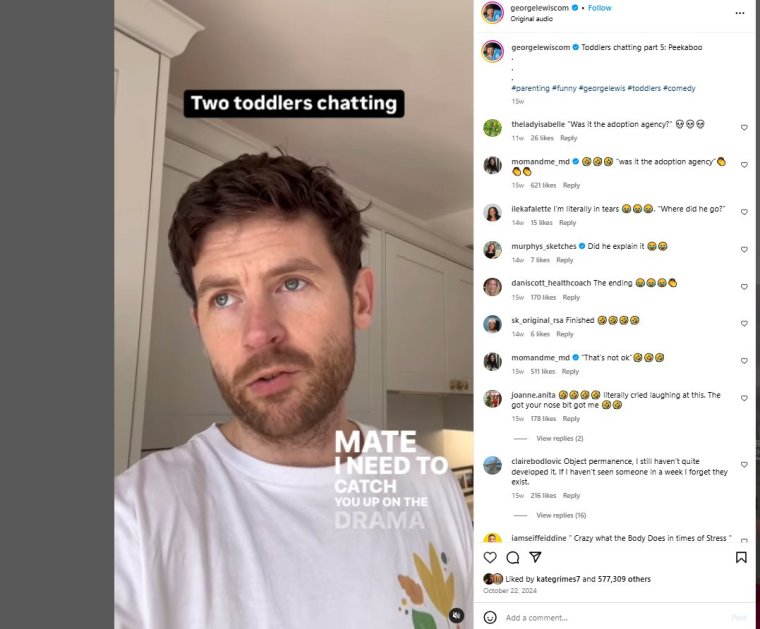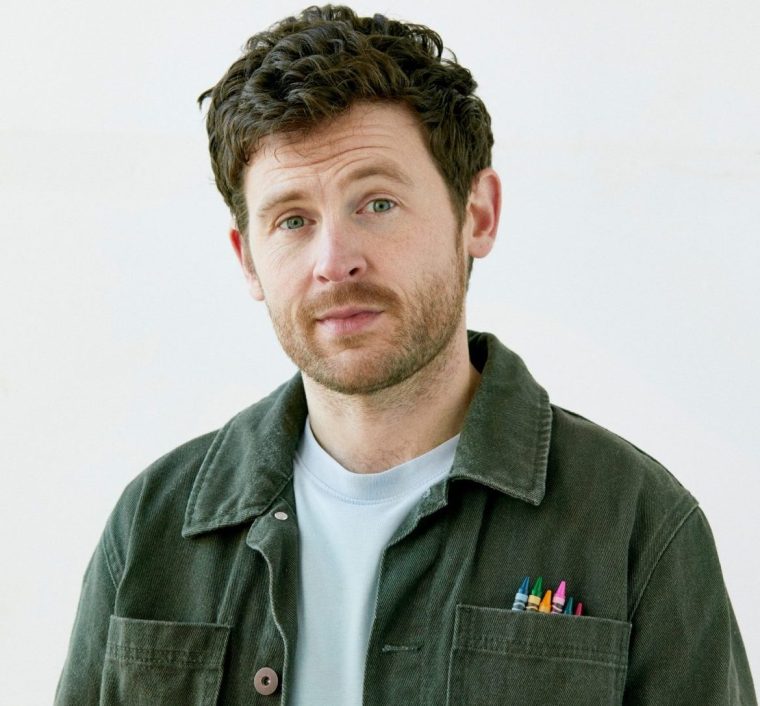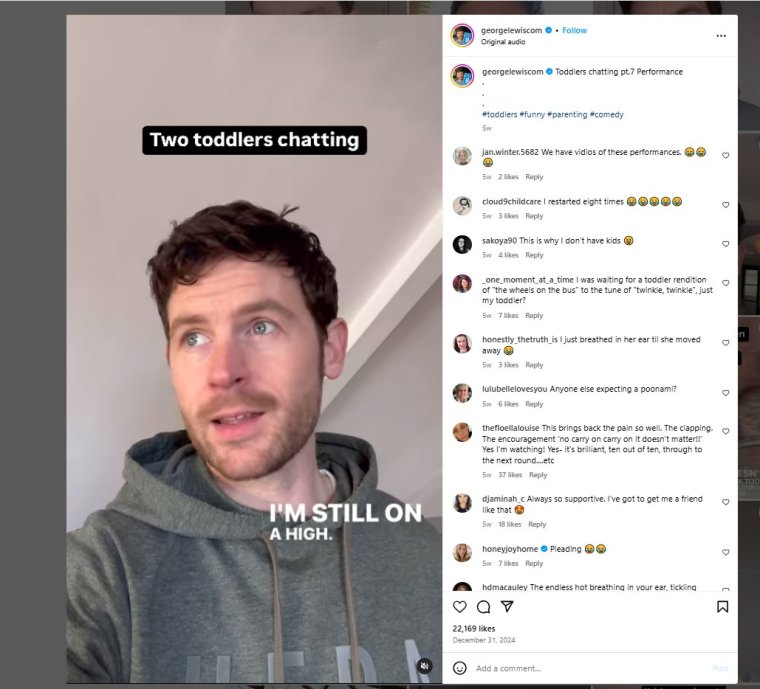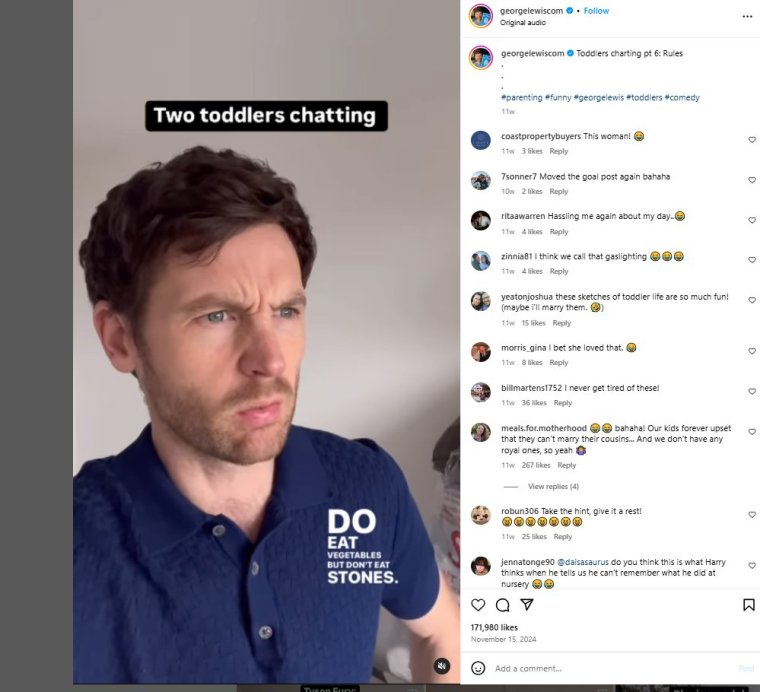Scunthorpe was the end of the road for George Lewis. Nothing against Scunthorpe, obviously. But he just couldn’t do it any more.
He’d been a circuit comedian for a decade or so, playing to rooms that were somewhere between boozy anarchy and outright indifference. That night in 2022, in a room he’d played several times before, he’d met a mixture of both: “I turned up and I thought, this just looks unplayable. It just looks horrible.” The MC, a friend of his, agreed. “Gonna be one of those nights,” he said.
An hour or so later, Lewis had come out on top. He’d done what any stand-up dreams of doing: he’d walked into the bearpit and won. But back on the motorway toward Stockport, he was pretty miserable about it.
“I just didn’t feel good,” Lewis, now 37, says over Zoom. “It was like, ‘You’re just doing jokes that you know will win over people who are hammered and don’t wanna be there.’ And it’s like, if that’s the best it could have gone, and I still feel grubby driving home after it, can I do this for another decade?”
He thinks for a second. “Probably would have done.”

Lewis had been perfectly fine with where he was at, having supported Josh Widdecombe and Russell Kane and gigging around the country. His Instagram was full of perfectly serviceable observational stuff: a TK Maxx manager encouraging his staff to leave the shop in a state, some off-key football chants repurposed for mundane household tasks, a nice two-hander about feeling badgered into liking olives. But he’d stopped feeling anything.
So he started doing something different: little sketches about being a dad of three, which he uploaded to Instagram with some trepidation. Three years later, he’s got 640,000 followers, is nearing the end of his first headline tour of the UK, and has become a kind of poet laureate for parents with kids under five. There are lots of dad comedians out there. Lewis is clear of all of them.
The adults in Lewis’s sketches are clinging on by their fingertips, while the children look on in quiet bafflement. His massive online following is built on deadpan sketches about the more frantic end of keeping a household together – trying to keep a snoozy toddler from dropping off in the car, or having to steadily escalate threats until he’s threatening to take away food and drink privileges for a month – and his biggest series, Two Toddlers Talking. In this, he plays a pair of twentysomething-month-olds shooting the breeze like they’ve bumped into each other in the office kitchenette.
“I’m not actually sure if I’m thirsty or not,” says one toddler to his mate in a recent sketch, “so what I’ll probably do is I’ll take a big swig and then decide when it’s in my mouth. If I don’t fancy it, I’ll just open my gob and let it all dribble out.” His companion nods. “Then you can let all your fresh clean clothes soak it up. Sensible.”

Three years ago he was lucky to be getting 500 likes on a sketch; last year, one Two Toddlers Chatting skit, in which one tells the other about how his dad disappeared while playing peekaboo only to suddenly reappear again, hit nearly 600,000. “How did you react?” asks one toddler. “Well I was so relieved to have him back,” says the other, “I just started laughing.”
The first toddler nods sympathetically. “It’s crazy what the body does in times of stress.”
These days, his audience, both online and at shows, has changed a fair bit. “I can see from my analytics that most of my audience is mums, basically,” he says. “It’s 80 per cent women who are between 30 and 45.”
There are grandparents and a few youngish couples in there too, but the mums are the backbone. And so his live material leans into being a dad, rather than away from it as he had before. “ I’ve done thousands of gigs, and I’ve never enjoyed it as much as this,” he says. “It couldn’t be warmer. It couldn’t be a nicer gig.”
Lewis, who’s much more buoyant and boyish to chat to than his harassed Instagram dad character, spent a good decade avoiding being himself onstage. Now, though, playing other people has helped him finally find his own voice, and his gigs have become “so much more fun and so much more fulfilling”.
He used to go straight for the laughs, fairly brute-force gag-smithing to arm-wrestle audiences in pubs and clubs onto his side. “Whereas now… I’m trying to think about a way to say this that doesn’t sound wankerish…” He decides to embrace the wankerishness. “ It feels way more of a connection. And I remember hearing comedians talk about that and thinking, ‘Oh, bore off.’ But actually no, I totally get it.”

Stand-up had become mechanical and cold. “Whereas now I can’t not feel it because I’m talking about something real that’s happened, or something that I found really frustrating, and I thought it was only me. And then there’s hundreds of people going, ‘Oh no, that’s us as well’.”
Then again, he and his wife Harriet have had to dig in further than many parents. Their eldest son Teddy, who’s seven, has been diagnosed with autism and ADHD; his little sister Daisy, who’s five, is awaiting the results of tests to come back. Lewis and Harriet are now ambassadors for the autism charity Autistica, but for a long time he didn’t talk about it.
Before the diagnosis process got moving, he remembers feeling “so confused and lost and alone”. Getting there meant having to “focus on the horrible things over and over and over again for years”, trying to convince doctors of how badly their children were struggling.
“ At some points, it feels cruel,” he says. “It feels inhumane. You’re having to keep building up a body of evidence for all the terrible times, and we are having to video our daughter when she’s in these crisis points, so we can go to the people who are assessing and go, ‘Look, you’ve gotta believe us. This is what goes on.’”
He and Harriet had been managing with Teddy before he was diagnosed, gradually working out what made him happy and how to meet his needs. As Teddy grows up, having that diagnosis feels even more critical.
“ They might notice that they’re different as well. It means you can talk to them about it and they can accept who they are. I think once you are at that point, then even though being autistic means the world’s challenging in a lot more ways, it’s amazing in other ways as well.”

We speak a week or so after Donald Trump has decreed completely without evidence that pregnant women can give their unborn children autism by taking paracetamol. “ Which is so damaging because not only is it just thick, but it also implies it’s something wrong that we need to solve,” says Lewis. “And it’s just not. It’s not something that’s wrong – it’s just something that’s different.”
Being an internet comedian is, it turns out, a pretty good gig for a dad looking after a seven-year-old, a five-year-old and a two-year-old. He tends to write while his children are out at school, then will record them in his kitchen when they’ve returned. Schlepping from gig to gig after a day writing at a copywriting job feels a long way away.
He tends to write while his children are out at school, then will record them in his kitchen when they’ve returned. Now that he’s not playing in chintzy theatres to a home crowd every night, his former life schlepping from pub gig to pub gig after a day writing at a copywriting job feels a long way away.
“It felt so unrewarding at the time. I suppose you stick with it because you progress and you learn. But I think it would take a lot to motivate me to do it again.”
Teddy, at least, seems more interested in being a YouTuber, and has lately enjoyed pretending he’s going live to his subscribers on trips to the park. He and Daisy are coming to watch their dad for the first time on the last night of his tour in mid-November.
“ Maybe they’ll finally gimme some respect,” says Lewis. He pauses. “Or they’ll see me fail in front of the biggest audience I’ve ever played.”
George Lewis’s ‘The Best Thing You’ll Ever Do‘ tour ends on 16 November
